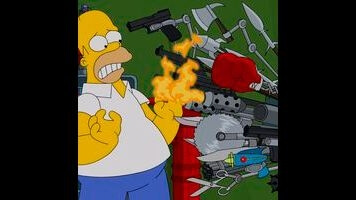The Simpsons: “Simpsorama”

Dennis Perkins: Crossovers are inherently unnecessary. Even if they’re not the result of corporate mandate or desperate ratings grab, the best that can be said of a crossover is that it provides two fanbases with a chance to play “spot the reference” and argue about which franchise was given more to do. The shows of the moderately anticipated Simpsons/Futurama crossover “Simpsorama” at least—like the Bart gremlin monsters that provide the impetus for said crossover—share some common DNA.
Unlike the Simpsons’ crossover earlier this season with the Show That Will Not Be Named, the sensibilities of these two shows aren’t so different and, in addition to the common Matt Groening ancestry, the episode is credited to J. Stewart Burns, a veteran of both. And while Futurama is naturally home to more outrageous sci-fi narratives, The Simpsons has ever edged into more and more improbably crazy territory over the years, thanks to the ever-elastic nature of its Springfield. It’s a cozy match, with Bender sent back in time, Terminator-style, to kill Homer—believed to be the cause of a swarm of very Groening-esque rabbit monsters that are destroying future New New York—and then immediately forgetting why he’s there and palling around with his intended target at the bowling alley. But, even when Professor Frink’s fiddling reboots Bender into “kill Homer” mode and the rest of the two casts meet up, everything remains that unobtrusively cozy. For two of the best and boldest animated series in TV history to combine to produce something so simply pleasant has to be counted as a failure.
Homer and Bender do make a natural couple, their sloth and irresponsibility combining into one hard-drinking, power-napping, fire-belching (only on Bender’s are on fire) comedy duo whose personalities mesh perfectly. Dan Castellaneta and John DiMaggio work well together, Homer and Bender’s similar indifference to the big picture giving each the opportunity to be himself while complementing the other. Just as, after the initial shock, Homer doesn’t overthink the ramifications of having a killer robot from the future as his new drinking buddy, Bender, once everyone but Maggie has been swept into that future, doesn’t let the probable global catastrophe caused by his failure keep him from taking his new best baby buddy to the track. There are times when familiarity isn’t a vice, and watching the Homer and Bender show is the best part of the episode for me—even though that lazy chemistry is sort of the problem with the whole enterprise. At least the Family Guy (fine, I named it) crossover gave me plenty of nice, energetic anger to think (and write) about—“Simpsorama”’s benign niceness just evaporated like a losing racehorse hit by Bender’s death ray while I was watching it. As the world’s foremost Futurama expert, Zack, did the big crossover underwhelm you, too?
Zack Handlen: It made me sad. Which isn’t to say this was soul-destroying; the premise was moderately clever, all the voice actors came back, the casts of the various shows stayed consistently in character throughout. Given the creative state of both The Simpsons and Futurama in its final season, this was about on par. Not particularly inspired, but never grossly offensive, with just enough laughs to keep you from feeling like the whole thing was a total waste of time.
Yet it’s painful to see two shows which, at the height of their powers, were capable of astonishing creativity, humor, and emotional depth, reduced to such a Scooby Doo Meets The Harlem Globetrotters exercise. There’s no reason for this episode to exist, at least not in terms of storytelling. Seeing the Simpsons family interact with Bender, Fry, Leela, Professor Farnsworth, and the rest has a certain automatic thrill to it, like any half-assed Internet mash-up (that thing I like is in the same place as that other thing I like! THIS CHANGES EVERYTHING), but that thrill never deepens or enriches our understanding of these disparate groups. Pairing up Bender with Homer is about as lazy a match as you can get, and when the episode tries to get something like actual feelings from their interactions, it’s embarrassing. Yes, it was sweet to see Homer sharing one last beer with a sleep-mode Bender, but it’s knee-jerk sweetness, like the reflexive “aw” you get when you watch a well made Hallmark commercial. It says nothing, means nothing, and leaves you with nothing, manipulating the audience with a sort of genial half-assedness that’s hard to love or despise.
There were some good gags. The evolution of the rabbit plague into an army of XenoBarts felt appropriately chaotic and violent for Futurama, and Homer’s casual “Why you little” head tearing was darkly amusing. Seeing Lisa teamed up with Farnsworth and Professor Frink scratched some weird nerd itch I didn’t even know I had, and the explanation for how the Planet Express crew ended up back in time was the mix of smart and intentionally lazy that typified some of that show’s best gags. As far as The Simpsons goes, well, the family was present, Homer made a reference to wanting to kill Flanders, and Bart was a little shit. So that all made sense.
But making sense doesn’t make something necessary. There were plenty of nods to classic Futurama to satisfy hardcore fans, and watching Nibbler devour one of the XenoBarts while Farnsworth was talking in the foreground made for a cute, unobtrusive bit. I was less pleased seeing Lisa use a holophonor to herd the creatures into Madison Cube Garden; it made a sort of sense, given Lisa’s love of the saxophone, but it still seemed like pandering.
 Keep scrolling for more great stories.
Keep scrolling for more great stories.
